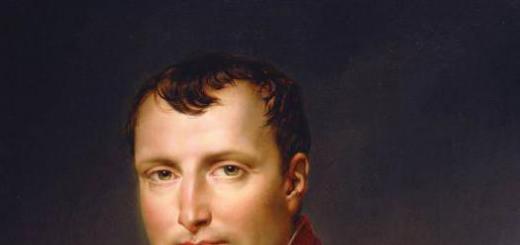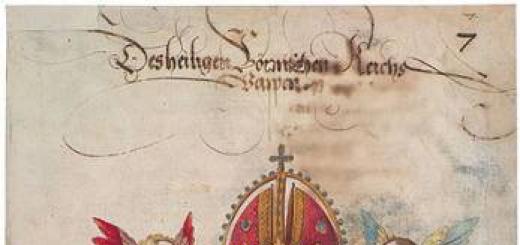One of the most important characters in the story "Lefty" N.S. Leskov is the Cossack Platov. During the first few chapters, the reader gets the impression that he is main character. The author assigns such a role to Platov's characterization from the story "Lefty" intentionally in order to emphasize how important the character is not only in the plot, but also in the ideological content of the work.
Service with Emperor Alexander
He is an experienced and courageous warrior who ended up in the service of Tsar Alexander Pavlovich, as well as a simple Russian man who did not like to prevaricate and adapt to others - such is the description of Platov from Lefty.
The emperor believed: “We, Russians, are no good with our significance,” therefore, he spent almost all the time abroad, admiring other people's skills, and the Cossack Platov was forced to accompany him on trips. He did not admire the achievements of the British, saying that Russian masters could create inventions no worse, but the emperor constantly besieged him, repeating: "Do not spoil my politics." The king simply blindly came to admiration for everything foreign, because of which the Cossack was very upset. After all, faith in a Russian person is one of the most important qualities of Platov.
Pain and resentment from the attitude of the king to his people
The situation was indicative when the tsar, visiting one after another English cabinets of curiosities, came to a real delight from the gun of the finest work. The British were flattered and pleased. But when Platov opened the product and saw a note there that it was created by a Russian gunsmith, he was incredibly happy. The Russian warrior hoped that the tsar would also be happy and proud. However, the emperor became very ashamed and uncomfortable in front of the British, because because of his subordinate they were in an uncomfortable position.
Platov reacted sharply and painfully to such behavior of the tsar. The image of Platov in the story "Lefty" personifies a person with high patriotic feelings. N.S. Leskov showed how important it was for a subject to influence the king's opinion about his country, on which its future depends.
An opportunity to prove the power of folk craftsmanship
Returning home, Platov retired. However, when the new Tsar Nikolai Pavlovich ascended the throne and tried to understand what kind of English gift it was in the form of a dancing flea, Platov immediately arrived at the court and told everything as it was. Seeing Platov's faith in the strength and mind of the Russian people, the emperor instructed him to go to Tula, show the local craftsmen there an English invention and ask them to create something similar.
Justified Cruelty
Platov showed some cruelty when he demanded that the Tula masters show their invention. He treated Lefty quite harshly when he brought him to Petersburg, almost tearing out his remaining hair. However, even such a characterization of Platov from the tale "Lefty" once again proves his devotion to the Fatherland and the new sovereign Nikolai Pavlovich, who was so confident in the high abilities of the Russian people, unlike his predecessor. Therefore, Platov was afraid to disappoint him. But, realizing his mistake, he changed his attitude towards the great folk craftsman Levsha and apologized to him.
“The sovereign became melancholy from military affairs and he wanted to have a spiritual confession”, “the sovereign thought that the British had no equal in art” - both quotes quite well describe the character of Alexander Pavlovich. He was a changeable, sentimental, but at the same time calm person. The sovereign, apparently, was a man of faith. But Alexander Pavlovich had one drawback: the emperor was not distinguished by patriotism and for a long time could not assess the abilities of his compatriots. Seeing the miracles in England, the monarch immediately decided that only the inhabitants of Foggy Albion could handle metals so skillfully - Russian subjects could not do that. It must be said that the sovereign was rather affectionate and gentle: when Platov embarrassed the English, Alexander Pavlovich was very upset for them. The emperor loved various kinds of amusements (traveling around Europe - why not amusement?), The monarch also liked man-made miracles. Moreover, it was quite easy to surprise the sovereign, and if he saw a strange thing for the first time, then "... everything seemed very good to him."
Updated: 2014-03-16
Attention!
Thanks for attention.
If you notice an error or typo, highlight the text and press Ctrl+Enter.
Thus, you will provide invaluable benefit to the project and other readers.
In 1814, Emperor Alexander Pavlovich travels around Europe, accompanied by the Don Cossack Platov:
“When Emperor Alexander Pavlovich graduated from the Vienna Council, he wanted to travel around Europe and see miracles in different states ... Under him was the Don Cossack Platov ...”
In Europe, everyone likes Emperor Alexander due to his affectionateness:
“... everywhere, through his affectionateness, he always had the most internecine conversations with all sorts of people ...”
Traveling around Europe, Alexander I studies the achievements of science, technology and art different countries. The king is very fond of foreign inventions:
“The British ... invented various tricks to captivate him with his foreignness and distract him from the Russians, and in many cases they achieved this ...”
“The British immediately began to show various surprises and explain what was happening .... The emperor rejoices at all this, everything seems to him very good ... "
Cossack Platov, accompanying the king, does not share this enthusiasm. Platov argues with the tsar, arguing that "our house is no worse than ours":
“And as soon as Platov notices that the sovereign is very interested in something foreign, then all the escorts are silent, and Platov will now say: so and so, and we have our own food no worse at home, and he will take something.”
In London, the British give Alexander I an amazing steel flea:
“This is our humble offering to your Majesty.<…>This, - they answer, - is not a mote, but a nymphosoria.
For the invention of this flea, Alexander orders to give the British a million:
“The sovereign immediately ordered the British to give a million, with whatever money they themselves want, they want in silver nickels, they want in small banknotes.”
Having presented Alexander with a flea, the British refuse to give a cover to it - and this despite the million they gave him. The soft, weak-willed Alexander is afraid of "spoiling politics", so he yields to the cunning English, and pays separately for the case:
“Leave it, please, it's none of your business - don't spoil politics for me. They have their own custom."
The weak Alexander does not protest against the "fraud" of the British. He justifies this trick with some kind of "custom":
"They have their own custom."
After a trip to England, Alexander I admits that Russian craftsmen are worse than English ones and that they are "good for nothing":
"... The sovereign thought so that the British have no equal in art ..."
“... You won’t argue anymore that we Russians are no good with our meaning.”
Platov advises Alexander I to change the "rules of life, science and food" in Russia - then Russian craftsmen will work no worse than the British. However, the king does not heed the advice of the Cossack:
“And he imagined the sovereign that the English masters have completely different rules for life, science and food, and each person has all the absolute circumstances in front of him, and because of this, he has a completely different meaning.The sovereign did not want to listen to this for a long time, and Platov, seeing this, did not intensify.
Military affairs suggest melancholy (sadness, melancholy) to the soft and sensitive king. He leaves for Taganrog:
“... The sovereign became melancholy from military affairs and he wanted to have a spiritual confession in Taganrog with priest Fedot.”
After the death of Alexander I, the box with the flea goes to his brother, Emperor Nicholas I:
“An amazing flea made of English blued steel remained with Alexander Pavlovich in a box under a fish bone until he died in Taganrog, giving it to priest Fedot, so that he would hand it over to the empress when she calmed down.”
Criticism about the image of Alexander Pavlovich in "Lefty"
“It is important to pay attention… to how the Russian tsars behave. Alexander, the winner in the war with Napoleon, in relations with the British appears, oddly enough, as a weak-hearted man, inadmissibly infantile, easily suggestible, and most importantly, indifferent to the national interests of his country.
The very “gentleness” of Alexander, about which ... the narrator speaks, in fact turns into “emptiness”, sentimental sensitivity, not at all befitting the king of a mighty state.
In Alexander's readiness to mindlessly admire all the rarities that the British show him, not without insidious intent, the complete absence of patriotic feeling in this head of state is manifested.<…>
The flea donated by the British, Alexander takes with him to Russia, and without thinking about the possibility of any retaliatory step that would make the British doubt their superiority over the Russians.
The new Russian autocrat Nicholas I is a ruler of an incomparably more firm character ...<…>The self-serving patriotism of Nicholas ... is subjected to unconditional ridicule, as is the lightweight Anglomania of Alexander.
(I. V. Stolyarova, “Leskov. complete collection essays in 30 volumes, introductory article to volume 1, 1996)
The theme of patriotism was often raised in the works of Russian literature of the late 19th century. But only in the story "Lefty" is it connected with the idea of the need for careful attitude to the talents that ennoble the face of Russia in the eyes of other countries.
History of creation
The story "Lefty" first began to be published in the journal "Rus" Nos. 49, 50 and 51 from October 1881 under the title "The Tale of the Tula Lefty and the Steel Flea (Shop Legend)". The idea for creating the work by Leskov was a well-known joke among the people that the British made a flea, and the Russians "shod it, but sent it back." According to the testimony of the writer's son, his father spent the summer of 1878 in Sestroretsk, visiting a gunsmith. There, in a conversation with Colonel N. E. Bolonin, one of the employees of the local arms factory, he found out the origin of the joke.
In the preface, the author wrote that he was only retelling a legend known among gunsmiths. This well-known technique, once used by Gogol and Pushkin to give particular credibility to the narrative, in this case did Leskov a disservice. Critics and the reading public literally accepted the words of the writer, and subsequently he had to specifically explain that he was still the author, and not the reteller of the work.
Description of the artwork
Leskov's story would most accurately be called a story in terms of genre: it presents a large temporal layer of the narrative, there is a development of the plot, its beginning and end. The writer called his work a story, apparently in order to emphasize the special “narrative” form of narration used in it.

(The emperor with difficulty and interest examines a savvy flea)
The action of the story begins in 1815 with the trip of Emperor Alexander I with General Platov to England. There, the Russian tsar is presented with a gift from local craftsmen - a miniature steel flea that can “drive with its antennae” and “twist with its legs”. The gift was intended to show the superiority of English masters over Russian ones. After the death of Alexander I, his successor Nicholas I became interested in the gift and demanded to find craftsmen who would be "no worse than anyone". So in Tula, Platov called three craftsmen, among them Lefty, who managed to shoe a flea and put the name of the master on each horseshoe. The left-hander, however, did not leave his name, because he forged carnations, and “no small scope can take it there anymore.”

(But the guns at the court cleaned everything in the old fashioned way)
Lefty was sent to England with a "savvy nymphosoria" so that they would understand that "we are not surprised." The British were amazed by the jewelry work and invited the master to stay, showed him everything they had been taught. Lefty himself knew how to do everything. He was struck only by the condition of the gun barrels - they were not cleaned with crushed bricks, so the accuracy of firing from such guns was high. The left-hander began to get ready to go home, he had to urgently tell the Sovereign about the guns, otherwise "God forbid, they are not good for shooting." From longing, Lefty drank all the way with an English friend "half-skipper", fell ill and, upon arrival in Russia, was near death. But before last minute life tried to convey to the generals the secret of cleaning guns. And if the words of Lefty were brought to the Sovereign, then, as he writes
main characters
Among the heroes of the story there are fictional and there are personalities that really existed in history, among which: two Russian emperor, Alexander I and Nicholas I, chieftain of the Don Army M.I. Platov, prince, agent of Russian intelligence A.I. Chernyshev, Doctor of Medicine M. D. Solsky (in the story - Martyn-Solsky), Count K. V. Nesselrode (in the story - Kiselvrode).

(Left-handed "nameless" master at work)
The main character is a gunsmith, left-handed. He has no name, only a craftsman's feature - he worked with his left hand. Leskovsky Levsha had a prototype - Alexei Mikhailovich Surnin, who worked as a gunsmith, was studying in England and passed on the secrets of the case to Russian craftsmen after returning. It is no coincidence that the author did not give the hero given name, leaving the common noun - Lefty is one of the types of the righteous depicted in various works, with their self-denial and sacrifice. The personality of the hero has pronounced national traits, but the type is shown to be universal, international.
It is not for nothing that the only friend of the hero, about whom it is told, is a representative of another nationality. This is a sailor from the English ship Polskipper, who served his "comrade" Levsha a bad service. In order to dispel the longing of a Russian friend for his homeland, Polskiper made a bet with him that he would outdrink Lefty. A large number of drunk vodka and became the cause of the illness, and then the death of the yearning hero.
Lefty's patriotism is opposed to the false commitment to the interests of the Fatherland of other heroes of the story. Emperor Alexander I is embarrassed in front of the British when Platov points out to him that Russian masters can do things no worse. Nicholas I's sense of patriotism is based on personal vanity. Yes, and the brightest "patriot" in Platov's story is such only abroad, and when he arrives at home, he becomes a cruel and rude feudal lord. He does not trust Russian craftsmen and is afraid that they will spoil the English work and replace the diamond.
Analysis of the work

(Flea, savvy Lefty)
The work is distinguished by its genre and narrative originality. It resembles in genre a Russian tale based on a legend. It has a lot of fantasy and fabulousness. There are also direct references to the plots of Russian fairy tales. So, the emperor hides the gift first in a nut, which he then puts in a golden snuffbox, and the latter, in turn, hides in a travel box, almost in the same way as the fabulous Kashchei hides the needle. In Russian fairy tales, tsars are traditionally described with irony, just as both emperors are presented in Leskov's story.
The idea of the story is the fate and place in the state of a talented master. The whole work is permeated with the idea that talent in Russia is defenseless and not in demand. It is in the interests of the state to support it, but it rudely destroys talent, as if it were a useless, ubiquitous weed.
Another ideological theme of the work was the opposition of the real patriotism of the national hero to the vanity of characters from the upper strata of society and the rulers of the country themselves. Lefty loves his fatherland selflessly and passionately. Representatives of the nobility are looking for a reason to be proud, but they do not bother to make the life of the country better. This consumer attitude leads to the fact that at the end of the work the state loses one more talent, which was thrown as a sacrifice to the vanity of the general, then the emperor.
The story "Lefty" gave literature the image of another righteous man, now on the martyr's path of serving the Russian state. The originality of the language of the work, its aphorism, brightness and accuracy of the wording made it possible to parse the story into quotations that were widely distributed among the people.










